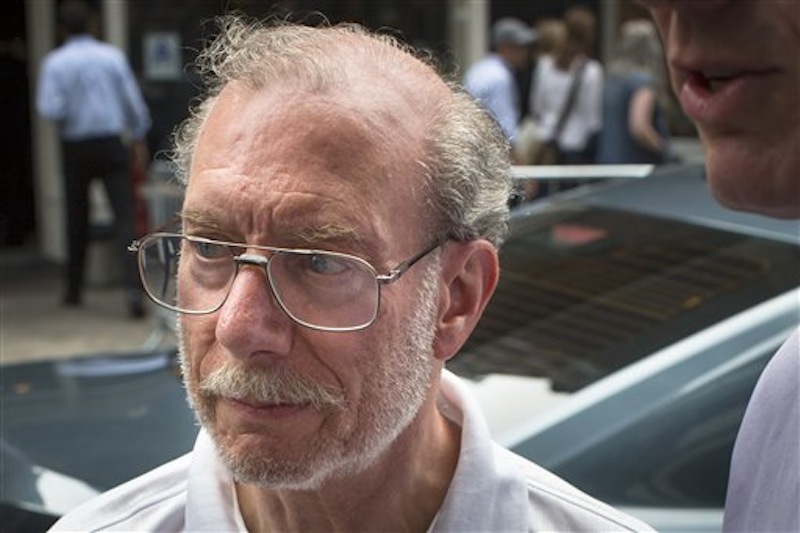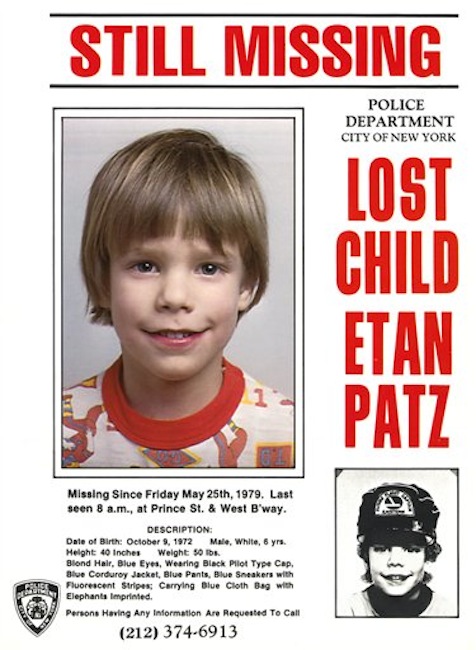NEW YORK — The anniversary of the day 6-year-old Etan Patz vanished on his way to school dawned with his suspected killer in police custody, but it ended with a muddled portrait of the man who confessed to strangling the little boy and dumping his body in the trash.
A former neighbor who knew Pedro Hernandez as a teenager says he was someone you wouldn’t want to cross — a reserved but “pent-up” young man. But the pastor of his church says Hernandez, now 51, is simply a shy and timid man who faithfully attends Sunday services.
Now on suicide watch at Bellevue Hospital, Hernandez was arraigned Friday via video link from a hospital ward on a charge of murder. His court-appointed lawyer, Harvey Fishbein, told the judge that Hernandez is bipolar, schizophrenic and has a “history of hallucinations, both visual and auditory.”
Hernandez, who was a teenage convenience store clerk at the time Etan went missing, now lives in Maple Shade, N.J. He was arrested Thursday after making a surprise confession in a case that has bedeviled investigators for 33 years. Hernandez told police he lured Etan into the basement of a convenience store with a promise of a soda, choked him to death, then stuffed his body in a bag and left it with trash on the street a block away.
The legal proceeding lasted only about four minutes. Expressionless, wearing an orange jumpsuit and handcuffs, Hernandez didn’t speak or enter a plea.
A judge ordered Hernandez held without bail and authorized a psychological examination to see if he is fit to stand trial.
The prosecutor who appeared in court, Assistant District Attorney Armand Durastanti, said it was 33 years ago Friday that 6-year-old Etan Patz left his home on Prince Street to catch his school bus. “He has not been seen or heard from since. It’s been 33 years, and justice has not been done in this case,” Durastanti, said.
Etan disappeared on May 25, 1979, on his two-block walk to his bus stop in Manhattan. It was the first time his parents had let him walk the route by himself.
Next to the bus stop was a convenience store, where Hernandez, then 18, worked as a clerk. Police interviewed him this week, acting on a tip.
Etan’s remains were never found, even after a massive search and a media campaign that made parents afraid to let their children out of their sight and sparked a movement to publicize the cases of missing youngsters. Etan was one of the first missing children to be pictured on a milk carton.
Hernandez’s confession put investigators in the unusual position of bringing the case to court before they had amassed any physical evidence or had time to fully corroborate his story or investigate his psychiatric condition.
Police spokesman Paul Browne said investigators were retracing garbage truck routes from the late 1970s and deciding whether to search landfills for the boy’s remains, a daunting prospect.
Crime scene investigators also arrived Friday morning at the building in Manhattan’s SoHo section that once held the bodega where Hernandez worked. Authorities were considering excavating the basement for evidence.
They also were looking into whether Hernandez has a history of mental illness or pedophilia.
Browne said letting Hernandez remain free until the investigation is complete was not an option: “There was no way we could release the man who had just confessed to killing Etan Patz.”
Legal experts said that even though police have a confession in hand, they are likely to work hard to make certain Hernandez isn’t delusional or simply making up the story.
“There’s always a concern whether or not someone is falsely confessing,” said former prosecutor Paul DerOhannesian.
As Fishbein arrived at the courthouse, he asked reporters to be respectful of some of Hernandez’s relatives there, including his wife and daughter.
“It’s a tough day. The family is very upset. Please give them some space,” Fishbein said.
Etan’s father, Stanley Patz, avoided journalists gathered outside the family’s Manhattan apartment, the same one the family was living in when his son vanished.
Former SoHo resident Roberto Monticello, a filmmaker who was a teenager when Patz disappeared, said he remembers Hernandez as civil but reserved and “pent-up.”
“You always got the sense that if you crossed him really bad, he would hurt you,” Monticello said, although he added that he never saw him hit anyone.
Monticello said Hernandez was also one of the few teenagers in the neighborhood who didn’t join in the all-out search for Etan, which consumed SoHo and the city for months. “He was always around, but he never helped. He never participated,” Monticello said.
Hernandez, who moved to New Jersey shortly after Etan’s disappearance, suffered a back injury that has kept him on disability for years, according to police.
The Rev. George Bowen Jr., pastor at Hernandez’s church in Moorestown, N.J., said he attended services regularly.
“I would judge him to be shy and maybe timid. He never got involved in anything,” Bowen said.
He said Hernandez’s wife, Rosemary, and daughter, Becky, a college student, went to see him Thursday morning after he was taken into police custody.
“They were just crying their eyes out,” Bowen said. “They were broken up. They were wrecked. It was horrible. They didn’t know what they were going to do.”
Police Commissioner Raymond Kelly said Hernandez gave a detailed confession that led police to believe they had the right man. He also said Hernandez told a relative and others as far back as 1981 that he had “done something bad” and killed a child in New York.
Send questions/comments to the editors.




Success. Please wait for the page to reload. If the page does not reload within 5 seconds, please refresh the page.
Enter your email and password to access comments.
Hi, to comment on stories you must . This profile is in addition to your subscription and website login.
Already have a commenting profile? .
Invalid username/password.
Please check your email to confirm and complete your registration.
Only subscribers are eligible to post comments. Please subscribe or login first for digital access. Here’s why.
Use the form below to reset your password. When you've submitted your account email, we will send an email with a reset code.